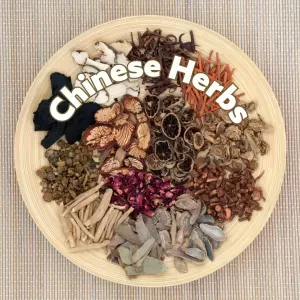By Qineng Tan, L.Ac., Ph.D. and Xiaomei Cai, L.Ac., Ph.D.

Hungry and tired all the time? Gaining weight even though you’re doing all the right things? These may be signs of insulin resistance. Acupuncture and TCM offer alternative treatment to help improve insulin sensitivity and support weight loss.
What Is Insulin Resistance?
Insulin resistance is a condition where your body’s cells stop responding well to insulin, leading to elevated blood sugar levels and a cascade of metabolic stress. Left unchecked, insulin resistance can lead to prediabetes, type 2 diabetes, cardiovascular disease, and trouble managing a healthy weight.
Insulin is a hormone produced by your pancreas that helps glucose (sugar) enter cells for energy. When your body becomes resistant to insulin, more insulin is needed to keep blood sugar in a normal range. Over time, the pancreas struggles to keep up, and blood glucose levels rise.
Insulin resistance often shows up with other health problems, such as high triglycerides, low “good” HDL cholesterol, elevated fasting glucose, and sometimes high blood pressure. There may not be obvious symptoms at first, which is why many people have insulin resistance for years before they are ultimately diagnosed.
Insulin resistance is often a significant part of PCOS, which causes irregular periods and fertility issues, along with increasing the risk of diabetes. Acupuncture and TCM can be an effective way to treat PCOS and insulin resistance.
Top 10 Signs of Insulin Resistance

How do I know if I’m insulin resistant? Many people will not notice any signs of insulin resistance and will find out about it until they have a fasting blood glucose test or tests that show high cholesterol levels.
However, there are symptoms that may be indicators of insulin resistance:
- Increased hunger, especially after meals
- Frequent energy crashes or feeling tired even after rest
- Frequent urination
- Difficulty losing weight or belly fat accumulation
- Darkened skin patches (acanthosis nigricans), especially around the neck or underarms
- Elevated fasting glucose or hemoglobin A1c (if tested)
- High triglycerides, low HDL cholesterol
- Possible mild elevated blood pressure
- Fatigue
- Dizziness, headaches
Can Acupuncture Help Insulin Resistance?
In Traditional Chinese Medicine, insulin resistance is seen not just as issues with sugar, but as a broader imbalance among Qi (vital energy), Blood, Yin, and Yang, often involving the Spleen, Liver, and Kidneys.
Spleen Qi Deficiency – the Spleen is responsible for transforming food into energy. Weak Spleen Qi means sluggish digestion, poor nutrient absorption, and accumulation of Dampness.
Phlegm-Damp Obstruction – in TCM, phlegm/damp corresponds loosely to fat accumulation, insulin-resistant fat tissue, or lipid disturbances.
Liver Qi Stagnation – can lead to emotional stress, which worsens metabolism, contributes to cravings, and disrupts hormonal balance.
Kidney Yin or Yang Deficiency – either or both depending on the person’s constitution and lifestyle. This can impair energy reserves, slow recovery, and reduce resilience.
TCM treatment is thus about addressing both root (constitutional) imbalances and branch (symptomatic) relief: strengthening digestion (Spleen), moving liver Qi, clearing dampness, nourishing the kidneys, and regulating blood sugar and energy.
Recent research has begun to show how acupuncture can directly influence the mechanisms behind insulin resistance, not just the symptoms.
A comprehensive review of both clinical and laboratory studies found that acupuncture helped improve common measures of insulin sensitivity, such as fasting blood glucose, insulin levels, and the HOMA-IR index. Patients who received acupuncture also saw improvements in cholesterol and triglyceride levels, reductions in abdominal fat, and better liver function in cases of non-alcoholic fatty liver disease.

Chinese herbal formulas are tailored to each pattern—some patients may need herbs to strengthen the Spleen and resolve dampness; others might need formulas to soothe liver Qi, or nourish Yin or Yang depending on their pattern.
Diet in TCM is also crucial. Reducing sugar, refined carbohydrates, avoiding damp-producing foods, and choosing foods that support spleen function (warm, simple, easy to digest) will help, and your practitioner can give you specific dietary advice.
Lifestyle practices such as gentle exercise, stress reduction (meditation, breathing work), good sleep hygiene, and regular rest help reinforce the effects of acupuncture and herbs.
Acupuncture Near Me for Insulin Resistance in Los Angeles
If you suspect you’re dealing with insulin resistance, or if you’ve been diagnosed with prediabetes, type 2 diabetes, or PCOS, acupuncture and TCM can be helpful. At Art of Wellness Acupuncture in West Los Angeles, we tailor our treatments to your unique situation, addressing the root causes and supporting sustainable metabolic health.
Don’t wait until medication is your only option. Contact us today to schedule a consultation and see how acupuncture and TCM may support your journey toward improved insulin sensitivity, balanced hormones, and healthier weight.
*This article is for education from the perspective of Traditional Chinese Medicine only. The education provided by this article is not approved by FDA to diagnose, prevent, treat and cure human diseases. It should not stop you from consulting with your physician for your medical conditions. Traditional Chinese Medicine is based on Qi, which is an invisible force that usually cannot be observed by modern science. Because science focuses on testing ideas about the natural world with evidence obtained through observation, these aspects of acupuncture can’t be studied by science. Therefore acupuncture and Chinese herbs are often not supported by double-blind, randomized trials, and they are considered alternative medicine therapies in the United States.
